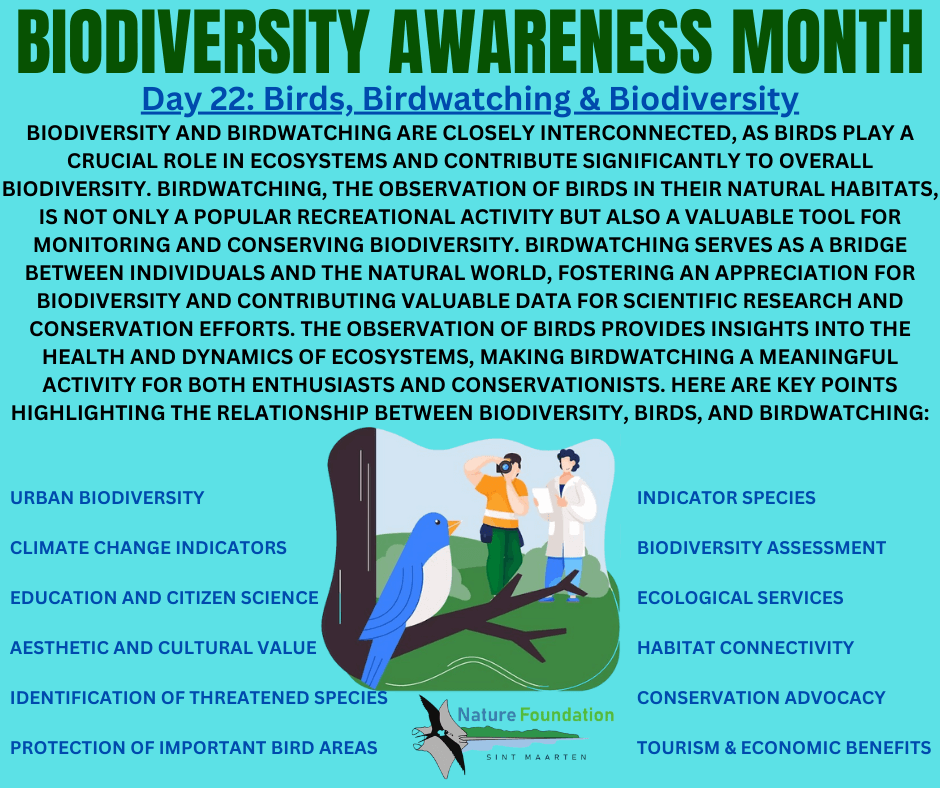Biodiversity month day 22: Birds and Birdwatching
The St. Maarten Hospitality & Trade Association supports the March Biodiversity awareness month organized by the Nature Foundation in an effort to help protect St. Maartens nature and biodiversity. Todays topic: Birds and Birdwatching
Biodiversity and birdwatching are closely interconnected, as birds play a crucial role in ecosystems and contribute significantly to overall biodiversity. Birdwatching, the observation of birds in their natural habitats, is not only a popular recreational activity but also a valuable tool for monitoring and conserving biodiversity. Here are key points highlighting the relationship between biodiversity, birds, and birdwatching:
1. Indicator Species: Birds are often considered an indicator species, meaning changes in their populations or behaviors can indicate broader ecological changes. Monitoring bird populations through birdwatching provides insights into the health of ecosystems and can help identify environmental issues.
2. Biodiversity Assessment: Birdwatching contributes to biodiversity assessment by documenting the presence and abundance of bird species in a particular area. Bird surveys provide valuable data for understanding the overall biodiversity of ecosystems.
3. Ecological Services: Birds play essential roles in ecosystems by providing ecological services such as pollination, seed dispersal, and insect control. Certain bird species contribute to the maintenance of plant diversity and help regulate insect populations, thereby influencing biodiversity.
4. Habitat Connectivity: Birdwatching often involves observing birds in various habitats. Birds are key players in maintaining habitat connectivity by moving between different ecosystems, contributing to genetic diversity and ecological balance.
5. Conservation Advocacy: Birdwatchers often become advocates for biodiversity conservation. The enjoyment and appreciation of birds can translate into support for habitat protection, environmental education, and conservation initiatives.
6. Tourism and Economic Benefits: Birdwatching tourism has economic benefits for local communities and contributes to the conservation of natural habitats. Birdwatchers may visit areas specifically for birdwatching, providing financial incentives for the protection of biodiverse regions.
7. Urban Biodiversity: Birdwatching in urban areas highlights the biodiversity that exists even in city environments. Urban birdwatching can foster an appreciation for local biodiversity and promote green spaces within cities.
8. Climate Change Indicators: Changes in bird migration patterns, nesting times, and distribution can serve as indicators of climate change. Birdwatchers contribute valuable observations to scientific studies tracking the impacts of climate change on bird behavior and distribution.
9. Education and Citizen Science: Birdwatching serves as an engaging form of environmental education. Additionally, birdwatchers often participate in citizen science initiatives, contributing their observations to scientific databases and research projects that support biodiversity monitoring.
10. Aesthetic and Cultural Value: Birds have aesthetic and cultural value, inspiring art, literature, and cultural practices. Birdwatching allows people to connect with nature on a personal and cultural level, fostering a sense of responsibility for biodiversity conservation.
11. Identification of Threatened Species: Birdwatchers, often equipped with binoculars and field guides, play a role in identifying and monitoring threatened bird species. This information is crucial for conservation planning and management.
12. Protection of Important Bird Areas (IBAs): Birdwatching often focuses on Important Bird and Biodiversity Areas (IBAs), recognized for their significance in supporting bird populations. These areas may receive special conservation attention due to their importance for biodiversity.
In conclusion, birdwatching serves as a bridge between individuals and the natural world, fostering an appreciation for biodiversity and contributing valuable data for scientific research and conservation efforts. The observation of birds provides insights into the health and dynamics of ecosystems, making birdwatching a meaningful activity for both enthusiasts and conservationists.
Back to the Visit St Maarten Main page

